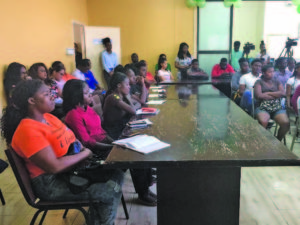
Over the course of the next four weeks, 40 additional youths from the Linden, Region 10 (Upper Demerara-Berbice) community will benefit from an Information Communication Technology (ICT) training workshop, an initiative of the Office of First Lady Sandra Granger in collaboration with the Social Protection Ministry and the Board of Industrial Training (BIT). The programme, which is the third of its kind in Linden, targets adolescents and out-of-school youths between the ages of 16 to 25 and was launched at the Linden Enterprise Network on Monday.
It will see participants being trained with job-readiness skills. Speaking at the launching ceremony, First Lady Sandra Granger emphasised the importance of ICT in ensuring that youths are well equipped to meet the challenges Guyana will be faced with in moving forward.
“We keep going after ICT because…this is where the jobs lie. Robots would have taken over sixty per cent of our jobs…It is estimated that ninety per cent of the jobs women do will be done by robots or through technology. So, this is why I’m all fired up to get women involved in ICT…The young people of Guyana are a major part of our population, so it is a fact that you are the ones who have to take us forward…As you know, eyes are on Guyana, not only with the discovery of oil but all the technology associated with it, not least among which would be ICT technologies,” the First Lady told participants.
She also challenged communities to move towards digitising records, hence giving persons skilled in ICT an opportunity to develop their skills. In giving an overview of the workshop, Chief Facilitator Fitzroy Younge extended gratitude to the First Lady on behalf of the people of Linden. He also credited her for the belief that ICT is the new frontier of change which fosters poverty alleviation. Younge said the objective of the programme is to empower not only young adults but unskilled and vulnerable groups within the community.
He added that elements of the workshop will also entail “Soft Skills”, which will include telephone ethics, interviewing and communication skills, etc, while ICT will include Knowledge basics and keyboard references, Introduction to Computers, Microsoft Office Word, PowerPoint and Micro-Enterprise, among others. Other classes will include Numeracy and Literacy, Sexual and Reproductive Health and STEM Robotics. In his remarks, Regional Chairman Renis Morian pointed out that the initiative was created by Government with emphasis on young people, whom he noted are the future leaders. He encouraged the participants to seize the opportunity, noting that the sky is the limit.
“Don’t just see this as (a) one-off, don’t just see this as we’re just teaching ICT, but the whole business is to ready your mind for developmental work programmes and jobs that would be coming your way,” Morian said.
Seventy-nine persons have been trained so far from the region via the initiative which is available throughout all the 10 Administrative Regions.



